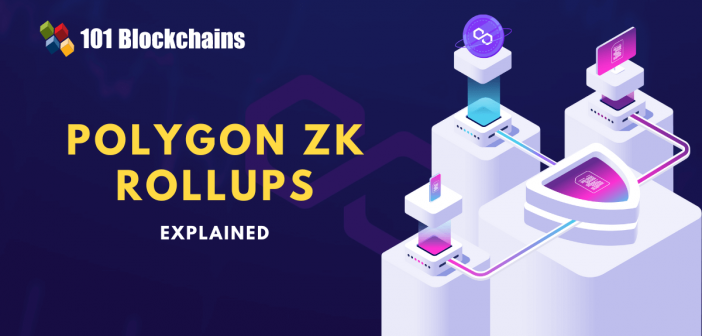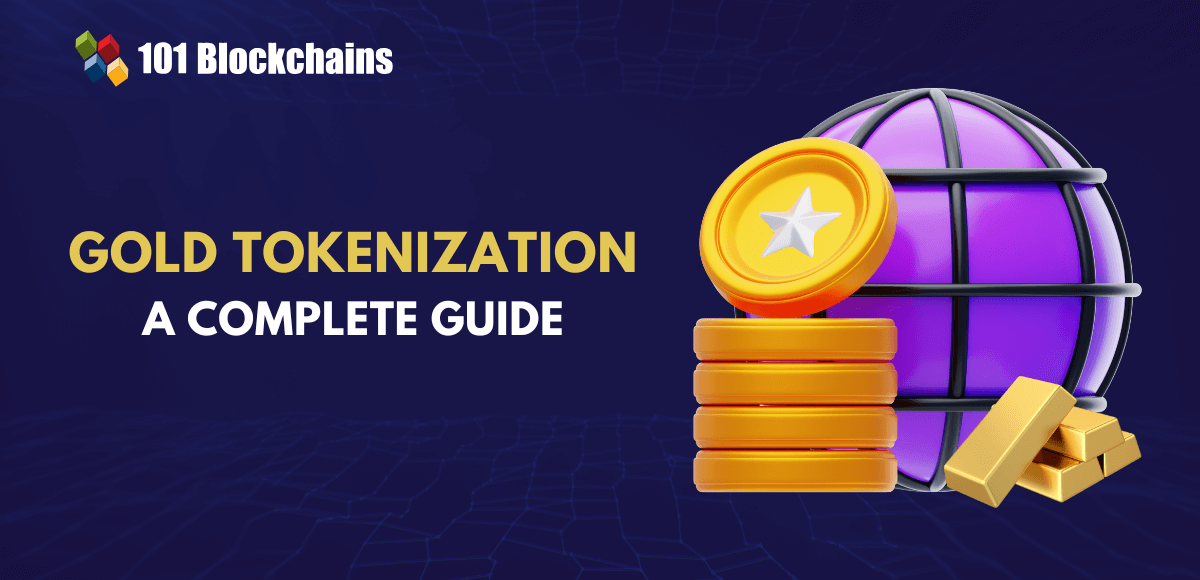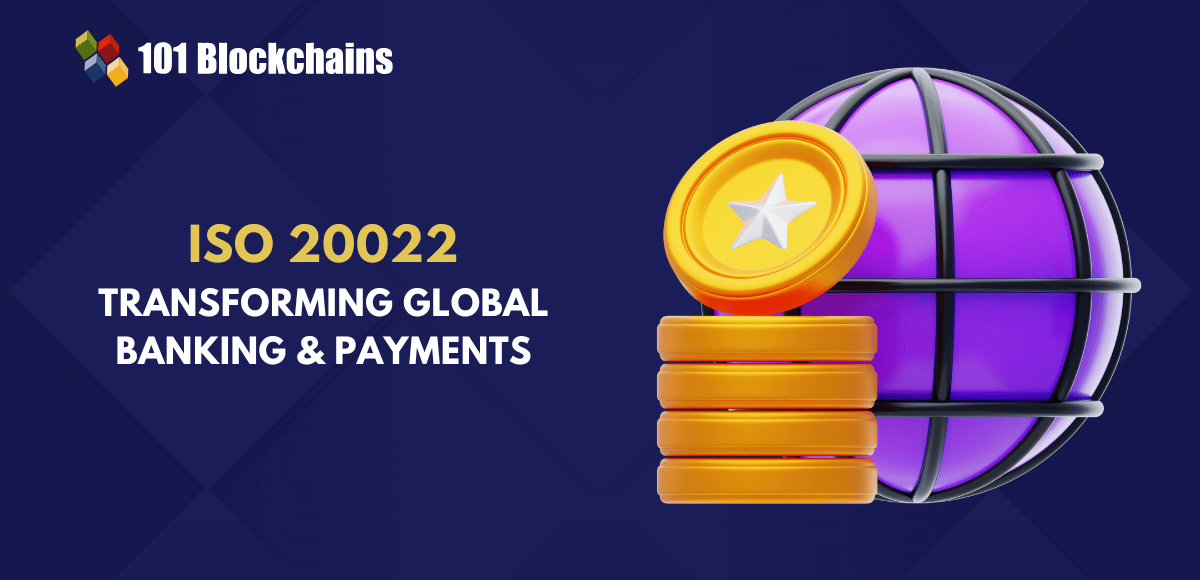Learn how blockchain truly works, master key definitions, and uncover what makes smart contracts so "smart." Dive into the fundamentals, gain valuable insights, and start your blockchain journey today!

- Guides
James Howell
- on January 09, 2023
Everything You Need to Know About Polygon ZK Rollups
Polygon has emerged as one of the notable solutions for addressing the scalability issues of Ethereum. One of the prominent highlights of Polygon, which validate its potential for resolving scalability problems, refers to zero-knowledge rollups. The importance of Polygon ZK rollups has been gaining attention in the crypto domain after the launch of zero-knowledge Ethereum Virtual Machine or zkEVM.
Polygon is one of the prominent web3 infrastructures with some of the biggest companies in the world, such as Reddit, Meta, and Stripe, using its diverse functionalities. Polygon launched the Polygon zkEVM in July 2022 as the first scaling solution with features similar to Ethereum, such as support for developer tools, wallets, and existing smart contracts. You can identify zkEVM as an equivalent of the Ethereum network, albeit with better security through zero-knowledge proofs.
How are ZK rollups relevant to the zero-knowledge Ethereum Virtual Machine? ZkEVM serves as the platform for powering ZK rollups in the Polygon network. Now, ZK rollups are a critical component for drawing out Ethereum transactions from the main chain to ensure scalability. Interestingly, Polygon has come up with many ZK Rollups in its product suites, such as Polygon Zero, Polygon Miden, and Polygon Hermez. The following post offers a detailed introduction to ZK rollups available on Polygon, alongside reflecting on their importance. Furthermore, you can also learn about how zkEVM and ZK rollups work together on Polygon.
Excited to develop a comprehensive understanding of Polygon? Join Standard/Premium Plan and get free access to Polygon Fundamentals Course Now!
Significance of Polygon Blockchain for DeFi
The benefit of smart contract programmability on Ethereum offered the ideal opportunity for developing decentralized apps. Subsequently, decentralized finance or DeFi applications such as decentralized exchanges, liquidity pools, and lending/borrowing platforms started gaining momentum. What is the best platform DeFi developers look up to? Ethereum. However, Ethereum could not handle the traffic of users developing their DeFi applications on the platform.
The answer to “What are Polygon ZK rollups?” would emphasize the problems Ethereum faces right now. The continuously growing demand for developing dApps on Ethereum for different use cases, such as DeFi, NFTs, and other web3 applications, has been responsible for increasing the burden of scalability. At the same time, network congestion also leads to problems with availability and higher transaction costs.
As Ethereum shifts towards the Proof of Stake protocol, it can offer better results in scalability. At the same time, layer 2 blockchain solutions have evolved as a prominent answer for scalability problems on the Ethereum blockchain. Polygon or MATIC is one of the most effective layer 2 scalability solutions with the facility of partnerships for expanding the Ethereum ecosystem. The importance of MATIC ZK rollups is evident in the names it has introduced to Ethereum, such as Adobe, Meta, Starbucks, Disney, and Adidas. Therefore, DeFi developers want to find out the best practices for leveraging Polygon with its powerful tools for scalability.
Want to know more about DeFi? Enroll Now: Introduction to DeFi Course
Definition of Polygon ZK Rollup
The rollups on Polygon are not different from the zero-knowledge rollups. ZK Rollups are an effective scaling solution that can combine different off-chain transactions into one on-chain transaction. Polygon ZK rollup suite helps in removing the necessity for verifying individual transactions through miners on the Ethereum mainnet.
On the contrary, Polygon MATIC ZK rollups ensure verification through a validity proof, also referred to as zero-knowledge proof, with each roll-up. The probability of the validity proofs ensures that Ethereum can verify the authenticity of all transactions in the rollup. As a result, users could ensure the seamless movement of funds and assets between Ethereum and the rollup.
The effectiveness of ZK rollups has also been compared with that of optimistic rollups. However, optimistic rollups present a notable setback in the form of a waiting period for confirming transactions. As a result, they can reduce the efficiency of dApps and value for users.
Polygon MATIC ZK Rollups Suite – List of Polygon ZK Rollups
The basic definition of Polygon ZK rollups explained that they offer zero-knowledge proof with the batch of transactions. The ZKP helps in proving that all the transactions in the batch are valid. Polygon has effectively utilized ZK rollups to strengthen its commitments toward the scalability of Ethereum.
The layer 2 blockchain network has introduced four distinct products in its scalability stacks, such as Zero, Hermez, Miden, and Nightfall. Let’s dive deep to understand them in detail.
Want to learn about Ethereum Technology? Enroll now in The Complete Ethereum Technology course.
Polygon Zero

The obvious answer to “Does Polygon use ZK rollups?” would refer to Polygon Zero. It is a trusted ZK roll-up solution tailored to reducing processing costs associated with creating validity proofs for all transactions in a batch. It is important to remember that the functionalities of ZK rollups are limited due to specific factors. For example, the process of proof generation is time-intensive and incurs higher costs.
Polygon Zero offers an effective solution to this problem with the use of ‘recursive proofs,’ which offer better speed than existing proof-generation systems. Polygon leverages the proving mechanism Plonky2 for recursive proofs. The team behind Plonky2 had developed the Mir Protocol for exploring the use of zero-knowledge recursive proofs in dApp scalability. Polygon acquired Mir Protocol, and the team continued their experiments on scalable proofs, resulting in the arrival of Plonky2 in January 2022.
The use of ZK rollups in Polygon also reflects on the efficiency of recursive proofs with Polygon Zero. In the case of existing projects, the process of generating proofs focuses on a specific batch of transactions. Polygon Zero can resolve the problem with a new approach that involves the simultaneous generation of proofs for each transaction in the rollup.
Subsequently, it can also help in a combination of different transaction proofs in single proof on the Ethereum network. The mechanism of ZK rollups could help in reducing the effort for the generation of credible validity proofs for transaction rollups. Polygon Zero offers the assurance of compatibility with EVM, as well as batching around 3000 transactions for each block.
Want to understand the core concepts of zero-knowledge proofs? Enroll Now in Zero Knowledge Proofs (ZKP) Masterclass Course
Polygon Hermez

The next addition among the answers for “What is Polygon ZK rollups?” would point you towards Polygon Hermez. It is a ZK rollup project focused on decentralization as the primary objective. Apparently, Polygon Hermez is the sole decentralized ZK rollup working over the Ethereum network. Hermez network utilizes the new Proof of Efficiency (PoE) consensus algorithm for ensuring better network security and decentralization.
Polygon Hermez features a collection of aggregators and sequencers responsible for basic functionalities of the rollup. Sequencers work on taking transactions and including them in batches. Aggregators work on generating ZK proofs for the batches they have to submit to Ethereum. The Proof of Efficiency system also ensures that any user can become an Aggregator or Sequencer.
In addition, it also ensures in-built crypto-economic incentives for encouraging honest behavior from the aggregators and sequencers. As a result, it can safeguard Polygon Hermez from the centralization problems affecting ZK rollups, alongside reducing the probabilities of malicious activities.
Polygon Hermez is a notable response to “Does Polygon use ZK rollups?” and proves how Polygon is the all-around scalability solution. Hermez protocol can ensure significant improvements in transaction throughput by leveraging the zero-knowledge technology. The protocol could add 2000 transactions in a single batch alongside generating SNARK or Succinct Non-Interactive Argument of Knowledge proofs for confirming transaction validity. However, the Hermez protocol lacked EVM functionality, which has been resolved with the introduction of zkEVM. The post will cover the details about the role of zkEVM for ZK rollups in the Polygon blockchain later.
Build your identity as a certified blockchain expert with 101 Blockchains’ Blockchain Certifications designed to provide enhanced career prospects.
Polygon Miden

Another prominent name in the list of ZK rollups you can find on Polygon is Miden. Polygon Miden serves as a general-purpose ZK rollup featuring EVM compatibility and the support of STARK-proof verification. The Scalable Transparent Argument of Knowledge or STARK ZK proof is a cryptographic proof featuring similarities to ZK-SNARKs.
In some cases, developers consider ZK-STARKs as a better option over ZK-SNARKs owing to the promising benefits. STARKs are generally effective in avoiding quantum-computing attacks and do not depend on a trusted setup procedure. However, STARKs are expensive due to the need for larger proofs.
On the other hand, the outline of Polygon ZK rollups explained for Polygon Miden must focus on how it can resolve the problems with conventional STARK-based ZK rollups. First of all, Polygon Miden is EVM-compatible, thereby ensuring that it can support Solidity smart contracts. It utilizes the Miden Virtual Machine for the execution of arbitrary logic and operations of smart contracts.
Developers could easily work on the compilation of code crafted in Vyper or Solidity programming languages into Miden Assembly. Miden Assembly is the programming language for entering instructions into the Miden Virtual Machine. It could help in processing around 5000 transactions in one block while ensuring the production of new blocks every five seconds; Polygon Miden also guarantees transaction throughput of more than 1000 transactions per second.
Learn how to build smart contracts with Solidity. Enroll in our Solidity Fundamentals Course Now!
Polygon Nightfall

Polygon Nightfall is another prominent addition to the Polygon MATIC ZK rollups suite. It is a business-grade roll-up solution tailored for offering private transactions. Interestingly, the project has developed as a result of the collaboration between Ernst & Young (EY) and Polygon Technology.
Polygon Nightfall leverages a unique roll-up design based on a combination of optimistic rollups alongside zero-knowledge cryptography. Optimistic rollups could help in reducing transaction costs, and zero-knowledge cryptography could help safeguard transactions from unauthorized intervention. Polygon Nightfall serves as an ideal solution for large-scale companies seeking permissioned and highly scalable blockchain transactions.
The architecture of Polygon Nightfall ZK roll-up involves four significant elements such as nightfall contracts, block proposers, liquidity providers, and challengers. Each component of Polygon Nightfall explains the importance of Polygon ZK rollups for the expansion of a decentralized ecosystem of decentralized services.
- Nightfall Contracts are the smart contracts responsible for governing activity on Polygon Nightfall layer 2 chains. The smart contracts also work on the management of the Block Proposer system alongside exercising responsibility for the selection, rotation, and eviction of Block Proposers.
- The Block Proposers in the Polygon Nightfall ZK roll-up product are the nodes that work on the validation of transactions and rolling them into batches. Subsequently, the block proposers must also submit the transaction batches back to the layer 1 blockchain.
- The next important component in the architecture of the Polygon Nightfall rollup is challengers. Challengers serve a critical role in ZK rollups Polygon has to offer as they verify whether the Block Proposers behave honestly. The Challengers work on the generation of fraud proofs followed by submitting them on-chain for challenging invalid blocks.
- Another significant aspect in Polygon Nightfall ZK rollup refers to Liquidity Providers or LPs. Liquidity providers can serve the role of monitoring the layer 2 chain and ensure the facility of liquidity of users interested in withdrawing Ethereum. Liquidity providers are essential components in the operations of Polygon Nightfall and solve many critical problems. The contributions of liquidity providers can help in resolving the issues of delayed withdrawals evident in other Optimistic rollup protocols.
The detailed architecture of Polygon Nightfall serves as a convincing answer to “Does Polygon use ZK rollups?” alongside emphasizing how Polygon is improvising and expanding the ZK rollups product suite. Polygon Nightfall could help in ensuring the secure exchange of ERC-20, ERC-777, and ERC-1155 tokens alongside safeguarding privacy. Although Polygon Nightfall has a transaction rate of around 100 TPS, it is an ideal choice for enterprise clients. The Polygon ZK roll-up solution serves the needs for private and fast transactions on the Ethereum blockchain.
Excited to develop a comprehensive understanding of Polygon web3 development? Enroll Now in Polygon Web3 Development Course!
The Role of zkEVM for ZK Rollups Suite of Polygon
As the name implies, zkEVM or zero-knowledge Ethereum Virtual Machine is the equivalent of the existing Ethereum Virtual Machine. How is it different, and how does it help MATIC ZK rollups offer better efficiencies? You can identify the importance of zkEVM by reflecting on the significance of ZK rollups and zero-knowledge proofs. One of the prominent issues in leveraging layer 2 networks is achieving scalability without any compromises in Ethereum transaction security.
The Polygon zero-knowledge EVM or zkEVM uses the zero-knowledge proof approach for reducing transaction costs alongside increasing throughput. At the same time, it can also use the security properties inherently from Ethereum. ZK-proof technology works by batching transactions into different groups, followed by relaying them to the Ethereum network in the form of a single transaction. zkEVM offers the foundation for Polygon MATIC ZK rollups and ensures proportionate distribution of gas fees for participants, thereby reducing transaction fees.
Web3 developers could also rely on the benefits of high security alongside censorship resistance with Polygon zkEVM. As a result, it has emerged as one of the formidable reasons to drive Polygon ahead of other layer 2 blockchains. In addition, zkEVM can also support Polygon ZK rollups by enabling easier migration of dApps on EVM-compatible chains. The advantages of Ethereum network effects and EVM equivalence in zkEVM can help developers use Polygon for developing dApps.
Zero-Knowledge EVM of Polygon also allows the use of programming languages like Solidity and smart contract development toolsets. Developers can easily migrate their dApps by switching nodes. Polygon zkEVM also offers flexibility for creating NFTs, play-to-earn games, and many other web3 applications. The EVM equivalent on Polygon can empower the use of ZK rollups effectively with minimal overheads for developers. Now, developers could use the same code, apps, smart contracts, and tooling as on Ethereum, albeit with prominent advantages.
Aspiring to Become a Certified Web3 Expert? Enroll in Certified Web3 Professional (CW3P) Certification Course Now!
What Are the Benefits of Polygon ZK Rollups?
The detailed overview of the responses for “What is Polygon ZK rollups?” including each product, the Polygon zero-knowledge rollup suite, establishes their necessity for web3 developers. The zero-knowledge rollups on Polygon serve additional value advantages in comparison to traditional ZK rollups. Here are the prominent reasons why ZK rollups developed by Polygon can serve as valuable assets for web3 developers.
-
Speed
The foremost setback associated with conventional ZK rollups such as zkSync or StarkNet refers to the computational costs associated with the creation of validity proofs. In addition, the ineffectiveness of proof generation mechanisms can help in offsetting the advantages of ZK rollups. On the contrary, the details of Polygon ZK rollups explained that they could effectively reduce the processing cost required for proof generation. Polygon Zero can leverage recursive zero-knowledge proofs to ensure faster transactions.
-
EVM-Compatibility
The introduction of zkEVM is a prominent highlight in the value advantages of Polygon layer 2 blockchains. It can support EVM functionalities for ZK rollups Polygon offers in its product suite. With the exception of zkSync, which launched a zero-knowledge EVM implementation recently, the majority of ZK rollups do not have compatibility with Ethereum. Therefore, Polygon zero-knowledge rollups have a competitive edge over other ZK rollups, which could not introduce promising improvements in Ethereum capabilities.
-
Cost-efficiency and Security
The stack of Polygon ZK rollups has been designed to reduce transaction costs associated with the use of layer 2 blockchains. It does not require expensive or time-intensive validity-proof generation mechanisms. On the contrary, it allows anyone to participate in the Polygon ecosystem while safeguarding security through zero-knowledge proofs.
Start learning Blockchain with World’s first Blockchain Career Paths with quality resources tailored by industry experts Now!
Bottom Line
The various entries among the Polygon MATIC ZK rollups offer distinct solutions to the problems evident in traditional ZK rollups. DeFi and web3 developers need efficient and faster solutions for creating their applications while ensuring compatibility with Ethereum, the holy grail of web3 infrastructure.
However, ZK rollups have been affected by setbacks such as expensive proof generation and lack of EVM compatibility. Polygon resolves these issues with its ZK rollups, such as Polygon Zero, Miden, Nightfall, and Hermez. Recently, Polygon has also launched an EVM equivalent with the Polygon zkEVM to support its ZK rollups. Learn more about Polygon blockchain and its basics now.
*Disclaimer: The article should not be taken as, and is not intended to provide any investment advice. Claims made in this article do not constitute investment advice and should not be taken as such. 101 Blockchains shall not be responsible for any loss sustained by any person who relies on this article. Do your own research!





